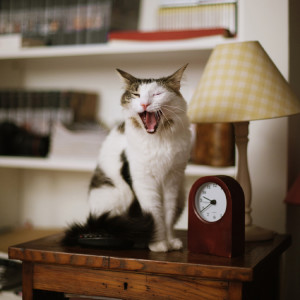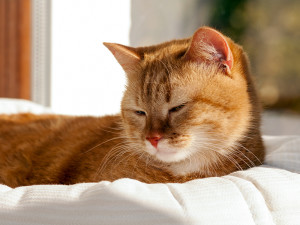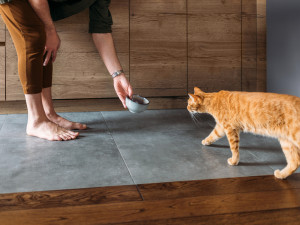Can You Give Cats Benadryl? (Dosage Guide)
And learn what alternatives might be better.

Share Article
Yes, Benadryl can be given to cats in certain situations, but it should only be administered under the guidance of a vet. It is not the most effective medication for cats in many cases, and your vet may have a more appropriate recommendation. Also, determining the proper dosage of Benadryl for your cat depends on many factors, making it crucial to consult with your vet before giving them any medication.
You may have heard of people giving Benadryl to cats because it is an over-the-counter medication that is relatively safe at the proper dose, but whether or not you should give Benadryl to your cat and whether or not it will actually be effective depends on a number of factors.
Can you give cats Benadryl?
Theoretically, yes, cats can safely take Benadryl so long as the dose is appropriate for them and they don’t have other medical conditions or take other medications that might complicate its effects. And while it may be safe under these circumstances, it is not always effective for the reasons people want to use it. Always consult your vet beforehand to make sure it is an appropriate choice.
What is Benadryl?
Benadryl is the trade name for the drug Diphenhydramine, which is an antihistamine. Histamine is a compound released from certain cells in the immune system as part of an inflammatory response.
This may happen when there is a real threat as well as when the immune system perceives a threat, such as with conditions like allergies. The result is that histamine triggers a number of reactions including redness, swelling, and itching. Antihistamine medications like Benadryl stop this reaction. Not all antihistamine medications are equal in their efficacy, though. Especially when it comes to cats, some are more effective than others.

Potential benefits and side effects
Benadryl is sometimes claimed to have three main uses: to treat signs of allergies, to prevent vomiting, and/or to cause sedation. However, when it comes to cats, it does not consistently have all of these benefits.
Benadryl is primarily used to treat signs of an allergic reaction, such as itchy skin or hives, and/or more serious signs of anaphylaxis which can include swelling of the face and difficulty breathing.
In a veterinary setting, this medication is given as an injection to provide fast-acting relief. For some people and pets, Benadryl can also act centrally on the brain to reduce nausea and vomiting, such as with motion sickness. This does not seem to be the case for cats, unfortunately, and there are other drugs that are extremely effective at reducing motion sickness for cats. Finally, using Benadryl as a sedative comes with a lot of caveats.
First, it does not consistently provide sedation and even if it works initially, the effects tend to decrease with each use, so it will not work for very long. Second, and this is the big one, some cats can experience excitation and agitation instead of sedation. This makes it a very risky choice for cats that are already very stressed or become aggressive in certain situations. There are many safe and effective sedatives for cats, so this is another case where you are much better off speaking with your vet and getting the right medication for your cat’s specific needs.
The main side effects of Benadryl include sedation, as well less common effects including dry eyes, loss of appetite, seizures, and/or difficulty urinating. For these reasons, Benadryl should be avoided in cats with certain pre-existing medication problems including glaucoma, urinary blockages, asthma, seizures, hyperthyroidism, high blood pressure, liver disease, or a history of aggressive behavior.
Certain effects can also be more pronounced in cats taking other medications at the same time, especially sedatives and certain behavioral drugs. It is very important to check with your vet regarding any possible drug interactions before giving a new medication.
Proper Benadryl dose for cats
When it comes to figuring out the proper dose for a cat, there are many factors to take into consideration including the reason for giving Benadryl, any other medications the cat is currently taking, and/or any pre-existing medical conditions a cat may have. All of these factors influence the appropriate dose of the medication, so it is very important to double-check with your vet about what dose is safe and appropriate for your specific pet.
As a general guideline, medications are dosed based on a cat’s body weight in kilograms. However, for cats who are overweight or obese, veterinarians often dose the medication based on what their lean body weight should be, to avoid overdosing them. Most of the time, the dosing for Benadryl starts at about two milligrams per kilogram of body weight, meaning that a cat weighing 12 pounds would take 10 milligrams of Benadryl.
In some cases, a higher dose of medication is used for specific situations, so your vet may prescribe a different dose for certain reasons. If your vet directs you to buy Benadryl at the pharmacy, be sure to double check that you purchase a medication that only contains diphenhydramine and no other ingredients. Some formulations may also have decongestants or pain relievers meant for humans that are toxic to cats.
Importance of veterinary guidance
The importance of veterinary guidance cannot be overstated when it comes to medicating your cat. Even over-the-counter medications have the potential to cause serious harm, so be sure to speak with your veterinarian before giving any medications or supplements. Sometimes, you may think you know what’s wrong with your cat and it can turn out, the medical problem is something entirely different and Benadryl isn’t going to help.
Other times, your vet may consider factors like your cat’s other medical conditions, concurrent medications, or behavior challenges, and recommend a safer, more effective medication in place of Benadryl. Finally, certain situations, like anaphylaxis, a severe allergic reaction where there is facial swelling, difficulty breathing, and/or collapse, are medical emergencies and it would not be safe to give your cat a medication like Benadryl by mouth and wait for it to take effect. Anaphylaxis can quickly become life-threatening and it is critical to get your cat to a veterinarian right away for more intensive treatments.
What does Benadryl do for cats?
Benadryl is an antihistamine, so it primarily acts to treat symptoms of allergic reactions. While Benadryl has other side effects that may be beneficial, these are not consistent effects, and are not the same across different species like humans, dogs, and cats. When it comes to cats, here’s how Benadryl does and does not work:
Benadryl for cat allergies
As an antihistamine, Benadryl technically treats allergies; however, when it comes to cats, Benadryl is not the most effective antihistamine. Cats with chronic allergies like itchy skin will get more relief from other kinds of antihistamines as well as other classes of medications that treat allergies. Benadryl is used in an emergency setting to treat more severe allergic reactions, but in this case, vets give the med as an injection, often in combination with other treatments.
Benadryl for cat anxiety and sedation
One side effect of Benadryl is that it can cause sedation in some species. If you’ve ever taken Benadryl, you may have experienced this. If your cat takes Benadryl, they are unlikely to be sedated; it just hits them differently. Even if they are sedated, the sedating effects tend to wear off with repeated exposures, meaning that the more times they take Benadryl, the less sleepy it would make them each time.
Not to mention, Benadryl does not directly have anti-anxiety effects, so even if it makes your cat a little sleepy, they may still feel anxious and will need relief from that. Finally, there is the really unfortunate risk that some cats will actually become excited and agitated instead. This is especially bad if you are traveling, or if you have a cat who is already aggressive, and now they cannot be handled safely.
Bottom line, it is definitely not a reliable or recommended way to sedate a cat. The good news is that there are some very effective and safe sedatives and anti-anxiety medications for cats that your vet can prescribe in conjunction with behavioral modification techniques.
Benadryl for cat sneezing
Cats sneeze for many reasons. There are many common viruses that can cause sneezing, and some kitties will sneeze if they have foreign material stuck in their nose. Other cats develop chronic scar tissue and inflammation in their nasal passages which is called chronic rhinitis.
For these common causes of sneezing, Benadryl is not effective since the sneezing is not being caused directly by an allergic reaction. There are more targeted treatments that will help cats that are sneezing for all of these reasons as well as more unusual reasons, so this is a case where your cat really needs to be checked out by their vet.
Alternative options for feline allergies and anxiety
Because Benadryl is not the best choice for cats with allergies or anxiety, you may be wondering about other options that may be more effective for your cat. The good news is that there are many effective medications out there and your vet can help you find the best fit for your cat. Some categories to consider include:
Other antihistamines
Cats may respond better to other antihistamine medications instead of Benadryl. Your vet can help guide your options, and it’s important to know that different cats may respond better to one versus another. You may need to try a few to find the best match. Only give them one antihistamine at a time, but if you don’t see a response in the first 14 days, try switching to another antihistamine that your vet approves.
Prescription medications
Sometimes, over-the-counter options are not going to be the most effective choices for your cat’s problem. Other classes of medications, like antibiotics, steroids, anti-inflammatories, and long-term allergy medications are only appropriate to use if your vet has diagnosed a specific condition and has prescribed these medications for your cat.
Natural remedies
Depending on the condition, sometimes there are other natural remedies that may help your cat get relief, and many times, these can be used in conjunction with other medications. Be sure to check with your vet before starting these, too. Even natural products can carry risks, especially if they are not formulated specifically for cats.
Environmental modifications
Whenever possible, tackling your cat’s problem from as many angles as possible is a great idea. In addition to medications and other medical treatments, there might be ways to modify their environment, too. This can be especially effective for behavioral challenges; many cats need more mental enrichment and physical exercise if they live indoors.
If your vet has recommended a sedative or behavioral medication, you can also work with a behaviorist or trainer on ways to enrich their environment and bring in some fun interactive toys and puzzles. While it may be tempting to try to modify your cat’s environment if they suffer from allergies, this really only works if you know exactly what your cat is allergic to and if it is something you can control. For example, if your cat has had reliable allergy testing performed by a dermatologist.
FAQs (People also ask):
Can I give my cats Benadryl for sneezing?
Benadryl is not a great choice for a sneezing cat because it cannot treat the most common causes of sneezing in cats. Your vet can suggest more effective treatment options.
Can I give my cat Benadryl for anxiety?
Benadryl has no anti-anxiety effects, so it is not a good choice to help soothe an anxious cat. It also does not cause sedation for most cats. There are many effective medications and behavioral interventions that will help an anxious cat so be sure to speak with your vet or a behaviorist.
What does Benadryl do for cats?
Benadryl has limited uses in cats. It is most commonly used short-term for allergic reactions, like after a bee sting. There are other medications that are more effective for conditions like chronic allergies, anxiety, and nausea.
References:

Dr. Amy Fox, DVM
Amy Fox, DVM is a small animal veterinarian in New York City with over thirteen years of experience in a mixture of general practice, emergency medicine, and shelter medicine. A lifelong animal lover, Dr. Fox studied biology in college and then worked as a veterinary nurse before pursuing veterinary school at Cornell University. Her expertise includes surgery, dentistry, and management of chronic conditions, and she is interested in toxicology, pain management, nutrition, care of senior pets, and educational outreach. Dr. Fox also enjoys writing about veterinary medicine and teaching, and her work has previously appeared in Spruce Pets. In her free time, she loves to cook, garden, go for long runs, and hang out with her goofy mixed-breed dog May, who provides never ending comic relief!
Related articles
![White-and-brown cat sitting on a side table by a lamp with their mouth open, gagging]()
Your Cat Is Gagging. Should You Panic?
It’s not always an emergency — but it could be.
Does Your Dog Need Anti-Anxiety Meds?
How to cope with dog anxiety—from training to medication.
![kitten lying on the floor breathing through his mouth]()
Is My Cat...Panting?
“Cats don’t pant to cool off like dogs do.” Unless your pet is catching their breath after doing the zoomies, Dr. Gary Weitzman says it could be cause for concern.
![grey and white cat with tongue sticking out]()
Why Does My Cat Keep Throwing Up?
Here’s when you should worry.
![Red cat with squinted eyes laying in a basket closeup]()
6 Ways Your Cat Could Tell You They Are in Pain
Here are all the way your kitty is trying to tell you they’re hurting.
![Profile view of a man giving a cat food to eat]()
Why Is My Cat Not Eating? Causes, Symptoms, and Treatment
A veterinary nutritionist explains why your cat isn’t eating and how to increase their appetite.










